Matias Dalsgaard's Blog, page 25
January 7, 2019
Tips for Staying Fit by Eating Healthy Food
Eating healthy food can go a long way in keeping you fit. It works in several different ways. The following are some tips on how to maintain your fitness level with food that is good for you.
Eating healthy food can help you stay fit by keeping your weight down
A lot of the weight people gain is from eating a lot of calories and fat. Healthy food tends to be lower in these, and this can help keep you fit. For instance, you can eat a banana, an apple, a serving of spinach and a serving of broccoli for less calories than many pieces of cake.
It is much more difficult to overeat (although not impossible) if you are eating healthy simply because you can eat so much more food. The so-called “junk foods” are generally high in calories and fat so eating just a few of them can quickly raise your caloric intake to the point that you start to gain excess weight, which will make you less fit. In addition, when you are eating unhealthy, you do not gain good weight like muscle. Instead you gain fat.

Having an excess amount of fat raises your risk of many dangerous conditions such as high blood pressure, diabetes and high cholesterol, and also places you more at risk for deadly complications such as heart attack, stroke and cancer as you get older. Eating healthy can help keep you in a weight range that is good for you and this can help keep you fit as you age.
Eating healthy keeps you fit by giving you the proper nutrition, vitamins and minerals to lower your chances of a wide spectrum of diseases
Eating healthy fruits, vegetables, whole grains and other healthy foods can help lower your chances of the aforementioned diseases, regardless of weight.
Many of the ingredients are known to fight cancer and keep your heart healthy and strong. Study after study have proven that various healthy foods fight against all sorts of cancers, heart disease and other conditions.

Eating healthy does not have to mean you don’t enjoy your food.
There are many foods that are both delicious and healthy. Savory fruits such as berries and melons can be very delicious, and you can roast some vegetables for a fun addition to any meal.
If you are creative, you can make many dishes that incorporate these delicious and enjoyable foods. Everything should be eaten in moderation, and eat sweets sparingly.
The post Tips for Staying Fit by Eating Healthy Food appeared first on PineTribe.
November 12, 2014
Entrepreneurs: Don’t Forget the Big Picture
In a start-up culture, it is easy to get lost in your own world. This world includes our own language, colleague chemistry, and work ethic—and it is fine to have these unique traits internally. But we need to remember that many of our customers and peers don’t speak the language of a start-up, which isolates you from them in the long run. It is important to always take the time to step out of that world, making sure not to forget the big picture. This will allow you to connect and interact with the real world that you live and work in.
There are many ways to gain a broader perspective. Below are some suggestions from successful entrepreneurs who have found the secret to not becoming lost in their own world.
1. Use your Periscope
Tunnel vision is common in start-ups. Jordan Milne compares the entrepreneurial culture to being that of a submarine—while you’re in the working zone, you are all underwater, immersed in the job and focusing on moving forward. But like a submarine, it’s important to use your periscope. At times you may need to adjust your course. Taking a break to see where you actually are in the bigger scheme of things can help you do just that.
Jordan notes that entrepreneurs often find solutions, or scrap unfruitful tasks, right after coming back from a vacation. The change of perspective has allowed the person to realise how valuable (or invaluable) certain projects really are in the big picture. He encourages us to make sure this fresh perspective occurs everyday, and not just after our winter break. We can do this by simply changing our work setting a few times a day.
Lesson: Change your scenery to get a different perspective.

To hear more from Jordan, like him on Facebook.
2. Experience Art
Matias Dalsgaard, founder of the successful start-up GoMore.dk, has something most entrepreneurs don’t: A PhD in Philosophy. He believes that a reason why entrepreneurs become too narrow focused, is because their work becomes their main form of stimulation. During this process, we shrink the horizon of our imaginations—curbing our creative abilities, and our connection to humanity.
To extend our horizons once more, we need to fill our minds with culture. Experience art in different forms—watch movies, read philosophy, listen to music etc. Stimulate your mind so that it has more touch points than just your work. This will allow you to see the bigger picture that your work plays a role in.
Lesson: Broaden your imagination by enjoying art.
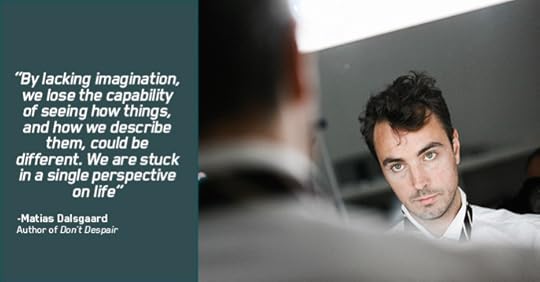
For more updates and insights, follow Matias on Facebook and Twitter.
3. Truly Listen
In a world filled with the voices of entrepreneurs trying to stand out, we tend to overlook an important trait: Listening. Serial entrepreneur, Martin Bjergegaard, spent time interviewing successful entrepreneurs from around the world, looking to find the keys to success while having work-life balance. One important lesson that he learned was the art of active listening.
Whether it is listening to your customers, family, or co-workers—when you actively listen, people are more likely to share their honest opinions. By filling the listening role in a conversation, you begin to see other perspectives more clearly. This in turn will make your own perspective much broader and help you see the big picture more clearly.
Lesson: Truly listen to other peoples’ perspectives, and you will broaden your own.

If you want to learn more about becoming a successful entrepreneur, follow Martin on Facebook and Twitter
Like Pine Tribe on Facebook for more insights on Nordic Leadership
The post Entrepreneurs: Don’t Forget the Big Picture appeared first on Pine Tribe.
October 21, 2014
How NOT to Find Joy in Your Life
Joy is tricky – it doesn’t come with a map or a user’s manual. In fact, many people couldn’t even define it if they had to. Yet, it is still something most of us try to find throughout our lives. While it would be impossible to offer some sort of “joy” recipe, there are certainly a few ways to guarantee you WON’T be able to find joy in your life.
1. Worry, About Everything
Worry is the opposite of joy. When you are worried, you are not living in the present moment. Rather, you are preoccupied with worries about yourself – a time consuming process that drains so much of your energy. Simultaneously, you have one eye fixed backwards while you look forwards and worry about your future. This is anything but joyful. Joy is about being present with yourself, about breathing freely and knowing with complete certainty that everything is right in the present moment.
2. Become self-absorbed
One of the fastest ways to prevent yourself from finding joy is to be self-absorbed. Self-absorption is linked to worry – it is also difficult to live in the present moment when you are consumed with thoughts of how you are being perceived by others. In joy, you surrender to the here and now. You have no problem being yourself, it just comes naturally to you.
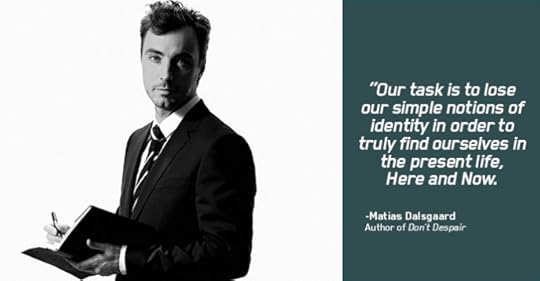
If you want to learn more about Matias, follow him on Facebook and Twitter.
3. Seek validation from others
Joyful people do not seek validation from others. Many people extract happiness from their accomplishments and gain their sense of self-worth from what others think of them. They perceive their place in the world in terms of how they compare to others. However, joyfulness comes from the ability to be present with yourself. You do not need to seek satisfaction or validation from anyone but yourself.
4. View joy as a destination
The reason why joy doesn’t come with a map is because joy is not a destination. It isn’t something that comes at the end of your journey – if it’s not there to begin with then it won’t be there at all. Joy is not something you receive after you’ve gotten over obstacles A, B, and C. Happiness is not something that you postpone until the future.
5. Fake it
I believe that the common phrase “fake it until you make it” works in some situations, for some emotions. Joy is not an emotion that should be faked, because when you do, it comes back to bite you. Joy is a double-edged sword; trouble arises when you try to make yourself the master of joy. If finding joy is just part of another self-development project, it won’t work. You cannot force joy upon yourself. Rather, you first have to allow yourself to become happy.
I can’t give you the recipe to find joy, but I can promise if you do all of these things above, you won’t find the joy in life. This piece was inspired by Matias Dalsgaards’s Don’t Despair. For more insights on joy and despair, check out the book below.
Don’t despair
by Matias Dalsgaard
Available in print and digital.
*Currency conversion varies
Image from here.
The post How NOT to Find Joy in Your Life appeared first on Pine Tribe.
October 7, 2014
5 Signs You Are an Insecure Overachiever
The concept of the insecure overachiever has been thrown around in relation to global consulting firm McKinsey & Co to describe the type of people they tend to hire. A former McKinsey employee himself, Matias Dalsgaard has connected what he has learned about insecure overachievers over the course of his career to his existentially unbalanced protagonist, Rasmus, in Don’t Despair. He analysed the insecure overachiever, and has discovered that their approach to work and life is not sustainable in the long term. The insecure overachiever, unless he or she is able to change, will struggle to find happiness, balance, and sustained success.
What is an insecure overachiever, exactly? To put it simply, an insecure overachiever is a personality type which applies particularly to young people in the early stages of their career. However, individuals of all ages and places on the career ladder can be classified as an insecure overachiever. Though the word “insecure” might not immediately imply a desirability in the business world, the insecure overachiever is actually a highly sought after type among many large companies.
Here are five signs you might be an insecure overachiever:
1. You Are Inconsistent
Insecure overachievers are very often fundamentally inconsistent, a trait which comes from a lack of a solid/stable foundation to build upon. Dalsgaard compares the behaviour to faulty construction work. An insecure overachiever builds upon a shaky foundation, hoping no one will notice as long as they continue building and building. This creates a state of panic – when will they be found out? They keep building as rapidly as possible. As soon as they stop building, it will be evident that the foundation is not solid and the building is sinking.
2. You are always trying to compensate for something
As an insecure overachiever, you stand on top of a foundation that is shaky at best, but you build upon this foundation anyways. As an insecure overachiever you are driven to achieve by your insecurity. You always have this idea in the back of your head that you are not good enough, and you feel the need to prove to the world that you are.

For more updates and insights, follow Matias on Facebook and Twitter.
3. You experience inner chaos
On the outside, insecure overachievers appear to be making great strides in their accomplishments. If you are an overachiever, you probably went to a well-respected university and received top marks. You had all the right extracurricular activities and outside projects on your CV. You were able to make great strides in your career, possibly through advancing quickly and earning promotions. This is the face you show the world. Your inner self, however, is struggling – the insecurities never go away. The more you succeed outwardly, the more you start to fall apart inwardly. The inner human experience is unchanged by outer growth.
4. You fear confrontation
The last thing an insecure overachiever would like to face is confrontation. It is an inevitable part of the human experience to confront yourself. When the superficial and beautiful things you have built your life upon disappear, you are left alone to finally confront your shaky foundation. It is this metaphorical “dark night” which reveals the truths you worked so hard for so long to avoid. To speak more specifically, the last thing an insecure overachiever wants to confront is themselves.
5. You are proud of being an insecure overachiever
In Don’t Despair, it was evident that Rasmus was not only aware of his status as an insecure overachiever, but he was proud of it as well – it was something he bragged about. Rasmus, and many of his fellow insecure overachievers, know that they have been sought out by the elite – the prestigious, large companies. The rest of the world, the 99% if you will, sees this state of being for what it is. But the insecure overachievers don’t care about the 99%, they care only about the opinions of the 1%. The approval from this 1% is what drives them.
The paradox of the insecure overachiever, however, is that the praise and approval is never enough. They continue achieving in order the approval of others, and it becomes a never-ending cycle. One will never be able to achieve happiness and balance in this manner.
For more insights on the plight of the insecure overachiever, check out Don’t Despair:
Don’t despair
by Matias Dalsgaard
Available in print and digital.
*Currency conversion varies
The post 5 Signs You Are an Insecure Overachiever appeared first on Pine Tribe.
August 25, 2014
5 Things To Know About Matias Dalsgaard
It’s been two weeks since the launch of Matias Dalsgaard’s epistolary novel Don’t Despair. Interested to know a little bit more about the man behind this existential and thought provoking book? I’ve compiled five things that will help you get to know Matias Dalsgaard a bit better.
1. He started out working for McKinsey & Company
Matias started his career at McKinsey, a global consulting firm, despite not coming from a business background. While at McKinsey, his focus was on the pharmaceutical and health care industries and had the opportunity to work in London and Chicago.
2. He has a PhD in Philosophy
Matias first studied literature for his Bachelor’s, where he became interested in writing, then went on to receive a Master in philosophy. After working for McKinsey, Matias hit the books again and earned his PhD in Philosophy. As a writer and businessman today, Matias combines all of his talents and interests. He believes his background in philosophy has helped him in the business world by giving him a broader perspective and being able to understand people better.
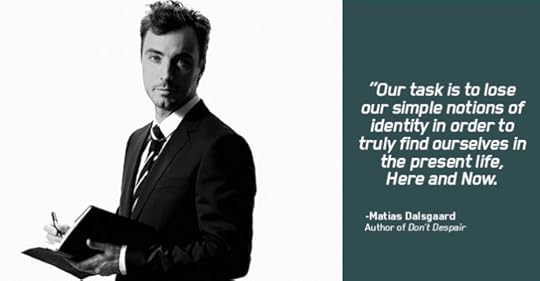
If you want to learn more about Matias Dalsgaard, follow him on Facebook and Twitter.
3. He is a scholar of Kierkegaard
Søren Kierkegaard was a Danish philosopher, theologian, poet, and religious author who is considered to be the first existentialist philosopher. Matias is also a founder and board member of the Protestantismenetværket – an interdisciplinary Danish research network focusing on the impact of Protestantism in Denmark.
4. He is the founder of GoMore
After completing his PhD in Philosophy, Matias entered the business world again in 2005. He is the founder of GoMore, a ridesharing and peer-to-peer car rental service with locations in Denmark, Sweden, and Norway. With over 160,000 users, it is the largest of its kind in Scandinavia.
5. He is the oldest of four brothers
No wonder Matias is able to write from the perspective of a Lutheran priest composing letters to his nephew, he has plenty of experience playing a mentor figure. Just an interesting tidbit of information!
Like Pine Tribe on Facebook for more information on Matias Dalsgaard and Don’t Despair
The post 5 Things To Know About Matias Dalsgaard appeared first on Pine Tribe.
August 22, 2014
How Existential are You? [Quiz]
We’ve all been confronted with the big questions out there and, presently, these answers are only limited by the extent of our imagination. But there are those who wish to push the boundaries of that limitation. They will dwell on the questions and their potential answers until time has passed them by. Then there are others who don’t devote their precious time to linger on what they feel are unanswerable questions.
But how existential are you really? After consulting with Matias Dalsgaard, a scholar of Kierkegaard, we’ve broken down the key traits that can help you find out where you lie on the scale of existentialism.
So where do you belong? Are you on your way to become a great existential philosopher? Or are you the realist who experiences the world at hand? Take the quiz and find out where you lie on the Existential Spectrum.
Take the Test>
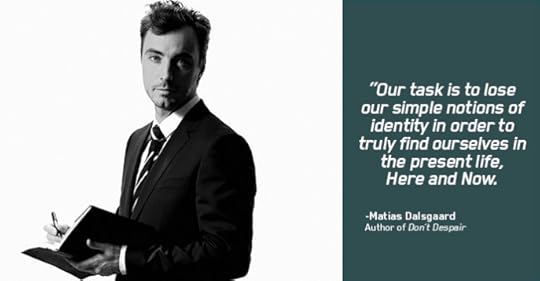
If you want to learn more about Matias, follow him on Facebook and Twitter.
The post How Existential are You? [Quiz] appeared first on Pine Tribe.
August 19, 2014
Are You Living By Comparison?
“Comparison is the thief joy,” said the late American ex-President Theodore Roosevelt. By this statement, Roosevelt was referring to what happens when we become wrapped up in comparison. We are unable to be happy when we live by comparison for there will always be someone better, smarter, faster, etc. I’m not sure who Teddy Roosevelt was comparing himself to. Maybe I’m a bit biased, but the man was pretty incredible. But for the rest of us out there, comparing ourselves to others often has detrimental effects on our levels of happiness. I wrote before about the backwards facing eye which plagues Rasmus, the subject of his Lutheran priest uncle’s letters in Matias Daalgard’s Don’t Despair. Rasmus is dealing with an existential crisis, and one of his sources of unhappiness is his distrust of the world around him and the need to analyse everything. In relation to these habits, another source of his unhappiness is his need to constantly compare himself to others in terms of success.
“You compare yourself to your ideal conception of yourself, and you get your ideal conception of yourself by comparing yourself to others. For you, the idea is to be a little better than the others – comparatively. When the only concept you have of your success is comparative, then nothing can stop comparison from running amok.”
It’s human nature to compare ourselves with others. By observing adults as children, we pick up on social norms and behaviours which come to dictate our own actions. This extends into adulthood. When you start at a new job, for example, you pick up on what the more established colleagues do – how long they take for lunch, how long do people normally stay until, etc. This is not the issue. In Don’t Despair, Rasmus’ issues with comparison stem from his inability to gain a concept of himself through any method other than by comparing himself to others. The need to constantly compare himself to everyone else turns into a never-ending cycle, as there is always someone new to compare to. When you are doing this, you only have a concept of yourself in terms of how you stand against other people. I think that this is something many of us can relate to.

For more updates, follow Matias on Facebook or Twitter.
The comparison problem, as we all know, is currently exacerbated by social media; there has been a lot of talk discussing the matter. We have more access to other people’s information. We can find out exactly what that guy we worked with on a project that one time is doing with his career, we know that girl we met at a party five years ago recently became engaged, we know that someone else is doing something cool. We see examples of other peoples’ success and immediately judge our own accomplishments against that. We wouldn’t let someone come up to us and dictate what we should want or strive for, so why do we allow ourselves to live up to a standard set by somebody else? Sometimes I start to think Roosevelt was lucky to live in a social media free world.
“And when you do better than others, how could you do anything other than worry about whether the others will catch up or overtake you?”
Once we have become successful, as Rasmus is described to have done, we are still unable to stop comparing ourselves to other people. We are still always worried that our success is fleeting and someone else will be waiting to steal the spotlight from us. We are barely able to relish in our accomplishments before we move on to the next concern. I am particularly guilty of this habit. Too many of us operate with a zero-sum approach to success, and this is the attitude which leads us to become caught in the comparison cycle. Fortunately, there is something that is truly wonderful about success and happiness—they are not finite resources. Someone else’s success doesn’t reduce your capacity for success, and someone else’s happiness doesn’t detract from the good things you already have in your life. If we can remember this, then maybe we will be able to break the cycle of comparison once and for all.
If the topic of self comparison truly resonates with you, I suggest you check out Don’t Despair. Dalsgaard offers a unique perspective on the topic, as well as providing insights to related topics that unknowingly have hindered our ability to become truly happy.
Don’t despair
by Matias Dalsgaard
Available in print and digital.
*Currency conversion varies
Image from here.
The post Are You Living By Comparison? appeared first on Pine Tribe.
August 6, 2014
Pine Tribe Author Interviews: Matias Dalsgaard [video]
In this week’s Pine Tribe Author Interview, I had a chat with Matias Dalsgaard. Matias is the author of Don’t Despair: Letters to a modern man, an epistolary novel that tells the story of Rasmus, an overachiever who becomes lost after his wife and child leave him. Written through the eyes of his Uncle Morten, a Lutheran priest, Don’t Despair critiques the modern lifestyle of the overachieving businessperson—helping them to overcome despair and allow for a renewed joy and courage to exist.
Check out the full interview below to learn more about Matias, why he wrote his book in its unique format, and how philosophy can give you a better perspective in business:
Matias comes from a unique background that blends philosophy with business practice. Initially wanting to be a writer, he studied literature as an undergraduate. His interests evolved and resulted in him getting a Masters degree in Philosophy. From there he changed course and began working for the global consultancy firm McKinsey and Co., only to eventually depart the firm and pursue a PhD in Philosophy. Now, with a doctorate under his belt, he’s returned to the private sector and co-founded his own company “GoMore,” Denmark’s leading ride-sharing platform.
Don’t despair
by Matias Dalsgaard
Pre-order ON PINE Tribe now for a 20% DISCOUNT!
Available in print and digital.
More about the book >
You will receive the e-book for download 1 week before market release on 11th August 2014.
*Currency conversion varies
The post Pine Tribe Author Interviews: Matias Dalsgaard [video] appeared first on Pine Tribe.
July 16, 2014
The Material and Spiritual Life: Living in two worlds
Today, I would like to ask you a philosophical question. It is question that I have never really been able to answer myself. The question is about two worlds – about a fundamental divide in human life. It is about two different dimensions of life that we all belong to and that, from my perspective, we can never fully reconcile. For lack of better words: I am talking about the material and spiritual dimensions of life.
My question is: Can these dimensions be reconciled? Or can we talk about life in a way so that the divide does not even come into existence? Current events at my company GoMore make me, once again, consider these questions. But let me first give a minimal philosophical introduction to the question.
“The human intellectual capacities only exist alongside with real human flesh and blood…There is no spirit without the material.”
Life is material. It is about flesh and blood and having food on the table. It’s about money, about having a house to live in, about our basic needs. But life is also spiritual. It is about human emotions and intellectual capacity, about imagination, about human communication and interconnectedness. It’s about art and culture – things that make us humans separate from the animals, making life worth living. Yet, the spiritual is also material. The human intellectual capacities only exist alongside with real human flesh and blood. Art and culture are expressed through the material. There is no spirit without the material. But you don’t get to learn or experience a lot of the spiritual if you are only willing to talk or think about it in terms of the material.
This divide in human life has in various ways been articulated in Christianity. When Jesus said: “Give to Caesar what belongs to Caesar, and give to God what belongs to God,” this was an expression of the divide. Man should take heed both the material (Caesar) and the spiritual (God) dimensions of life. In Protestantism this schism was emphasised when Luther talked about two realms: The worldly and Godly. Christianity might always have ranked the spiritual higher than the material. But when Jesus says “give to Caesar what belongs to Caesar” he also says that on earth you should obey and follow the rules of the earth. Even if you as a Christian have higher goals or aspirations than what is defined by the mere material – you should not try to escape the demands the material world puts on you, but deal properly with the demands and make them part of your life.
For Luther it was critical that his religious revolution within the church (what later became known as the Reformation) was not turned into a political revolution against the king or the established power. Therefore he could not support the peasants’ rebellion against the nobility. Luther was a revolutionary in terms of the spiritual, but a conservative in terms of the material. He rigorously distinguished between the two realms, and his calling was within the spiritual.
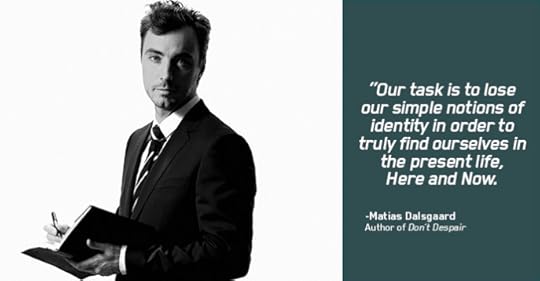
If you want to learn more about Matias, follow him on Facebook and Twitter.
I raise this point because I am puzzled by how I live (as we all do) in both realms. We are both matter and spirit. But what puzzles me is at the practical level.
I am the CEO and founder of the start-up company GoMore, a platform for ridesharing and peer-to-peer car rental. We are one of the many online businesses within what is referred to as “sharing economy” or “collaborative consumption”. Our business grows when people become better at sharing their resources and properties with each other – in our case it is about sharing the car. The motives for sharing for the individual person are various. Financial gain is key for many of our users, and so are the environmental and social benefits from sharing. But no matter what the motives are, there is something inherently social and human to our business – because the business only works when people trust and find joy in meeting and interacting with each other.
We have had hundreds of thousands of successful rides and thousands of successful car rentals. Things are going well—people are kind and considerate. We seem to be on a never-ending social honeymoon with our users. But as our business grows, we also see glimpses of another world – of a non-social, poor, and materialistic world outside of our social universe: A couple of weeks ago we had our first car stolen. A person never returned the car he had rented from a kind, trusting woman.

GoMore is a social ride sharing platform. Through their website and mobile app, users can be connected with each other to find cheaper travel options, as well as rent cars from private owners.
The problem has now been solved for everybody and the car owner has been fully compensated by GoMore and our insurance company – and the story is not in itself very interesting. But what interests me is my own reaction to such an incident. First I naturally called up the police to see what they could do about it. Realising how under-funded and over-loaded the police force is – and how little they were actually capable of doing – I decided to hire a private security firm to track down the thief and return the car. This was only partly successful since the thief seems to have left the country. But the security firm knows of his whereabouts and, in cooperation with the police, they will find him when he returns to Denmark.
Now, the people working at the private security firm do not exactly have a background in the “sharing economy”. They are trained for combat, for the most part in the military, and I would have approved of almost any means for them recover the car from the thief—the firm is of course fully legal and often cooperates with the police. We try to run a social business, but when elements with absolutely no affinity to the sociality that we try to establish threaten this business – then I am willing to do “whatever it f-ing takes” to protect my people and my business.
Personally I can’t help feeling a little schizophrenic when I one minute speak on the phone with a trained bodyguard from the security firm about how I would like him to track down a thief – and the next minute discuss happy, engaging social media content with our marketing people. These two things are so unrelated, obviously so not belonging to the same dimensions of life. One is purely materialistic and about basic survival (me or the thief), the other is spiritual and about engaging people at social level. But I am fine with it – I am willing to do it all. I just wonder, does life really consist of two dimensions that will never be fully reconciled? Are there truly separate realms for the material and the spiritual dimensions as it was always preached in Christianity? Do we simply have to accept this? This seems to the case for me, but I am willing to listen to any of your objections…
Matias Dalsgaard explores dilemmas of modern lifestyle in his epistolary novel “Don’t Despair“. The book is told through his unique Lutheran-Kierkegaardian perspective, examining urban modern living while delving into the conflict between the extremes of Christian values, and that of our present day hedonist lifestyle.
Don’t despair
by Matias Dalsgaard
Pre-order ON PINE Tribe now for a 20% DISCOUNT!
Available in print and digital.
More about the book >
You will receive the e-book for download 1 week before market release on 11th August 2014.
*Currency conversion varies
Feature image from: here
The post The Material and Spiritual Life: Living in two worlds appeared first on Pine Tribe.
April 15, 2014
Voice of Religion
Easter is coming up. A religious holiday, like most of our holidays – and this particular one celebrates the resurrection of Jesus Christ on the third day after his crucifixion on Good Friday.
More so in the States than in Denmark, heated debates over religion seem to be taking place. A part of the population is arguing that religion should play a smaller (or ideally NO role) in the public life of the nation. For instance the advocates of this standpoint would prefer that traditional Christian holidays like the Christmas holidays were re-defined as simply “winter holiday”. On the other hand, there’s a part of the nation that argues that the nation is built on religion (Christianity), and that it ought to play an even bigger role in how we organise life.
Even if the debates are highlighted more in the States than in Denmark – or Europe in general – we have similar debates in our part of the world. Also, as a society we have a similar tendency to move away from religion and towards secularisation, even though no one has yet succeeded in substituting Christmas or Easter holidays with “winter” or “spring” break.

Matias Dalsgaard is a the CEO of the startup GoMore, while also holding a Doctorate in Philosophy. His book Don’t Despair is built around an existential correspondence between a Lutheran priest and his nephew, reflecting on philosophical and theological perspectives through a modern setting
Now, I don’t care much for these debates. I don’t like when people are against religion. But I also don’t really like when people are pro religion – in an adamant sense. I like when people do religion. Discussions and debates are more often than not based on a certain lack of respect for, or the appreciation of, the praxis of peoples’ lives. In particular, the atheist position is often reductionist. It often reduces religion to a banal theory about the origin of the world, which it then rejects: “God did not create the world, Darwin was right—all religion is stupid.”
The voice of religion to me is not in the theories about the origin of the world or in the model of our society. It is a more personal praxis. This is why I like our religious holidays. They – once again – give you the chance to read the texts, to sing the songs or hear the sermons. When you do this, it doesn’t matter so much whether Easter holidays are called Easter holidays or Spring break – or whether our society is Christian or not. What matters is that you are the one hearing the uplifting words of the songs or the sermons. So go, enjoy that and have some good religious holidays…
Happy Easter.
Image from: Here
The post Voice of Religion appeared first on Pine Tribe.


 $US 7.90*
$US 7.90* $US 7.90*
$US 7.90*


